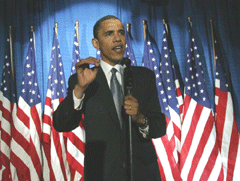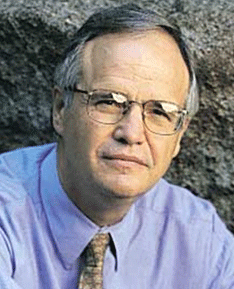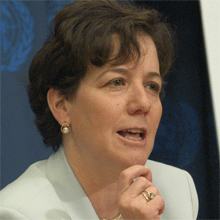The First 100 Days
Air Date: Week of November 7, 2008

With an election victory behind him, the spotlight moves to the first 100 days of Barack Obama's presidential administration. (Courtesy of Barack Obama)
President-elect Barack Obama has said the environment is going to be one of his top priorities. And with a changed political landscape on Capitol Hill, just how much will he accomplish? Host Steve Curwood and Washington correspondent Jeff Young talk with three green policy experts - Van Jones, author of “The Green Collar Economy,” Mindy Lubber president of Ceres, and James Gustave Speth, Dean of the School of Forestry & Environmental Studies at Yale - about what President Obama should take on in his first 100 days in office.
Transcript
CURWOOD: It’s Living on Earth, I’m Steve Curwood.
YOUNG: And I’m Jeff Young.
Ever since 1933, when FDR created the programs that would pave a path out of the Depression, the first 100 days of a new presidential administration has been the yardstick by which to measure a president's priorities and effectiveness. We're just months away from finding out how a President Obama will measure up.
CURWOOD: Joining us now to discuss what the new administration should and can do in those first months are three deep thinkers on green policy: James Gustave Speth, Dean of the Yale School of Forestry and Environmental Studies, Van Jones, author of the new best-selling book, "The Green Collar Economy," and Mindy Lubber, president of Ceres, a network of sustainable investors. Welcome to Living on Earth, everyone.
SPETH: Hi Steve. Good to hear your voice again.
LUBBER: Great to be here thank you.
JONES: Happy to be here.
CURWOOD: So Van Jones, let’s start with your green wish list for the Obama Administration. Policywise, what does a President Obama need to do right away to get the ball rolling on climate solutions?
JONES: First of all, I just want to say that I’m happy. Anybody who’s not happy this week – something wrong. This is a huge breakthrough. It feels like there’s no, no ceiling on what’s possible. I think we should dream big. The reality is that the last time the country got this far off track, FDR created something called the Civilian Conservation Corps – put people to work dealing with the economic and environmental challenges of that day. We think we need a “clean energy corps” to put people to work. You know, we can retrofit America – blowing in insulation, replacing glass that’s rattling around there, leaking out energy, slapping on solar panels. If we were to weatherize and solarize America, we could power our way through this recession, we could cut carbon, we could increase the value of people’s homes and we could show that green solutions don’t cost more. They actually save people money. You know, if our buildings were thirty percent more efficient, we’d be putting out thirty percent less carbon, but much more importantly, that work pays for itself in energy costs savings. You could actually pay the government back, it would be revenue neutral.

Green for All president Van Jones.
CURWOOD: But now how do you get this at the top of the agenda? How do you get this to happen at the beginning? I mean, Jeff Young, there in Washington, there are a lot of things competing on the agenda in these first hundred days.
YOUNG: Absolutely. And I think we’re also going to hear a pretty sharp argument from opponents of action on climate change that it with the economy heading into a deep recession or possibly worse, this is not the right time to do something that might add to energy costs. Mindy Lubber, isn’t that going to be a pretty serious argument?
LUBBER: Absolutely. You know President-elect Obama said in his acceptance speech – he talked about two things amongst some others. He talked about a planet in crisis and an economic crisis. One recommendation for President-elect Obama is, tie those things together. They are not separate. If the planetary crisis goes forward, it will exacerbate the economic crisis. We need to tie them together, build the real costs from climate change into our economic models and in the discussions that will be happening from day one on market reforms and on economic stimulus packages. Make climate part of those discussions, because they belong there, they’re financial issues as well as they are economic or environmental issues and they need to be built into the market reform discussions. And right now our tax code gives incentives to high carbon technologies. We need to switch those tax incentives and do it sooner rather than later. Stop giving tax incentives to high carbon intensive technologies and provide the tax incentives to the green technologies that are going to be the future of our economy. It is not all about costing money. Addressing climate change is about creating the green economy that is the economy that’s going to take us into the next decade and the next several decades.
CURWOOD: Gus Speth?
SPETH: Well I would agree very strongly with the very powerful pitch that Van and Mindy have made. But I also want to raise a little caution flag. At some point very early in this administration, we’re going to have to go beyond the proposals that they are describing and cap the emission of greenhouse gases in the United States and establish goals for their rapid reduction. And it’s going to require a climate legislation moving through the Congress that’s compatible with the international climate regime that will be forged at Copenhagen in December of 2009.

James Gustave Speth, Dean of the Yale School of Forestry and Environmental Studies.
YOUNG: Well, I think a lot of people when the Warner-Lieberman bill almost sorta kinda came to the floor - there was a realization here: “Wow, this is going to raise a lot of money.” And you saw all the finance committee guys wanting to get in on the game so they could help spread that money around. So, I think in Congress at least, you could try to sell this among people as a revenue generating activity that’s not called a tax, which is something that I think a lot of people are going to find appealing.
CURWOOD: And the money is raised by what – auctioning off the carbon rights …
YOUNG: Correct.
CURWOOD: … and that’s worth what – fifty billion a year?
YOUNG: Well, it’s gonna depend on the shape of the program. But Senator Obama – now President-elect Obama – has committed to an auction-style program there which would generate a lot of income.
CURWOOD: And that fits into your mathematics, Van Jones?
JONES: Well, it sure does. I definitely want to echo the dean here. You know, cutting carbon is the biggest human rights and civil rights issue of our time. The people who are gonna get hit first and worst if we don’t dramatically reduce carbon are poor people, vulnerable people all around the world. So, we say a dramatic reduction in carbon is the right policy. What we’ve got to be able to do is to take care of people now and going forward.
SPETH: I couldn’t agree with that more and I think the use of these revenues from the auctions can be used to cushion the impact on low income groups and on the groups that are adversely affected by the legislation, and that’s very important. There are other things that President-elect Obama wants to do that would also be very effective in providing decent economic opportunities and adequate income for people who could be otherwise seriously affected by rising energy prices.
YOUNG: Van Jones, I’m wondering what you think about where coal should fit in the future here? And what should President Obama do? What kind of message should he send to the coal industry?
JONES: Right now coal fits in really well where it is – in the ground. It’s where I think it belongs….
YOUNG: Ah ha ha ha.
JONES: … and I think that we need to quit with the fantasy about clean coal. You know, we could have clean coal or we could have unicorns pull our cars, we could have fairies light our homes with their wands. We don’t – there’s no such thing as clean coal technology right now. And what we do have is a Saudi Arabia of wind and a Saudi Arabia of solar and existing technology to tap that. We’ve got to have a breakthrough in transmission, we’ve got to have a break through in energy storage, but we got to talk a lot more about the losers here, not just the winners. We want to make sure that, you know, we spread those green jobs around, but some people are going to lose their jobs. We need to say to our coal miners in this country, who are heroes, who sacrifice their lungs, they sacrifice their communities, they’re now being asked to blow up their grandmothers’ mountain tops to keep powering America. You’re heroes. We appreciate you. We want to retire you with dignity and honor. We’re not going to try to make you go work for Wal-mart or become a computer programmer or something, you know, crazy. We want to retire you with dignity and honor. You powered America to this point, but now it’s time for those 150,000 people to be able to step back so a whole new set of industries can step forward. Getting the politics right, making sure people understand that there are material gains here is critical. We can’t drill and burn our way out. We can’t mine our way out. We can invent and invest our way out, and that’s the right direction for America.
CURWOOD: Now, Gus Speth, you were around with the Clinton/Gore transition and, as I recall, Vice President Gore particularly identified with trying to set up a BTU tax to take on the question of carbon back in 1993. And, well, I think to put it mildly, Congress rejected that. Less kindly, one would say that Mr. Gore has his head handed back to him trying to do something right away on climate change using tax policy.
SPETH: Well, it’s a totally different situation now. You know, we know that the climate issue is far more urgent today than it was then. And I think that the president needs to convene a sort of a brains trust right away to come up with a comprehensive overall plan to deal with this climate threat. This is a threat that the scientists are actually more concerned about than the environmentalists. It’s going to require a huge effort. We need somebody at the cabinet level who’s gonna be responsible for steering this large effort through the administration. I think the second thing the president ought to do is to convene a White House meeting of top scientists on this issue. He went from there to a major address to the American public from the Oval Office on what we have to do to deal with our combined problems of climate, energy dependence and the need to get the economy working. I think he’s got to take these three issues to the public together in a compelling way that really galvanizes and is the springboard for a large administration effort.

Ceres president Mindy Lubber.
CURWOOD: So let’s go back to you, Jeff Young, on Capitol Hill. We’ve laid out some really big issues here. How does a president who’s got – what – Afghanistan, Iraq, Wall Street, needs to get his kids a new puppy, I mean he’s got – the list is long.
[LAUGHING]
YOUNG: There are high expectations and there’s a lot on the menu, that is to be sure. I think, you know, we have seen very clear signals from Senator and then President-elect Obama in his victory speech that this is going to be a very top priority. The specifics of how he carries that out are not yet clear. Seems to me that one of the early trains leaving the station is likely to be an economic stimulus package and I’m wondering what our panel thinks about how many of these things can be addressed via an economic stimulus bill, because that’s one of the first things that I think Congress is gonna act on.
CURWOOD: Van?
JONES: I think that’s right. I mean, first of all, we’ve gone to bat three times now, well two times now to try to get the economy going. First we did a silly stimulus, where we just passed out checks to everybody and then people ran out to Wal-mart and bought flat screen TVs that are made in China, so we stimulated the economy – in China. We didn’t stimulate our own economy and so that creates a problem in terms of how we think about the stimulus going forward. Then we bailed out the banks we didn’t bail out the people, didn’t bail out the planet. So now, hopefully the third time will be the charm. We have the chance to do a green stimulus, a smart stimulus, a stimulus that would put people to work, greening our infrastructure. Those jobs have to be done here. That money will recirculate in the economy and create other jobs. That’s the real work of America going forward.

With an election victory behind him, the spotlight moves to the first 100 days of Barack Obama's presidential administration. (Courtesy of Barack Obama)
CURWOOD: Mindy Lubber?
LUBBER: Well, the first thing is we shouldn’t separate out putting a cost on carbon from the economic stimulus package. It’s the right market signal and that’s what needs to happen. We then need to make sure our tax incentives are in the right place, stop financing and providing incentives to the dirty pollution, put those incentives in place for clean technology. There are dozens of ways to do this. Prior administrations may have cared about it, but they didn’t show it in action. What we are hoping and expecting and believing President-elect Obama will do is do the kinds of things we’re talking about: make climate change and the economy an issue that’s tied together, make it a priority in the first three, four, sixth months and two years of his administration, put the right laws in place, the right regulations in place and it will be one of the factors that rebuild our economy rather than watch our economy in crisis.
CURWOOD: Look – these values have been out there for quite a while. You have – on Capitol Hill you have folks that come from parts of the country that are dependent on petroleum, on coal extraction, the manufacture of SUVs – these folks are looking at their own constituencies and saying, you know, I need to protect those.
JONES: Well, and they’re right to do that. I think that there is a legitimate fear in any transition – who’s gonna win and who’s gonna lose. The problem is that we are already at the end of the road for the last model where we ran the economy based on credit cards and consumption, everybody, you know, run out and buy stuff, that’s how we keep the economy going. We’re gonna have to start building stuff and producing stuff, and energy – clean energy – is one of those things we can produce. All the jobs that we need, including for people who right now are in polluting industries, are actually not in the dirty part, they’re in the clean and green part, and I think the president’s got to make that case over and over and over again.
SPETH: There are probably as many jobs – I think that there’s estimated – there are as many jobs can be created in what Van is describing as the jobs that this country has lost in this decade.
CURWOOD: How much time is there to get this agenda going before events and such take away the power of a new president to….
LUBBER: The reason we’re having this conversation, I truly believe, is because we are out of time. We should have been acting yesterday or last week. It is up to this president to show us the leadership that we need and we all have high hopes that he will, to make this a priority not only here in the United States but to lead internationally, so not only could we deal with a problem in a way it has to be dealt with and stop building two new coal fired power plants every week in China, but to regain America’s credibility in the world community on this very important issue.
CURWOOD: Mindy Lubber is president of Ceres. I want to thank you for taking this time, Mindy.
LUBBER: Thank you.
CURWOOD: Gus Speth, James Gustave Speth, is dean at the Yale School of Forestry and Environmental Studies and a former White House advisor for both President Jimmy Carter and President Clinton. Thank you, sir.
SPETH: Thank you, Steve.
CURWOOD: And Van Jones is the author of the new book, “The Green Collar Economy.” Thank you so much, Van.
JONES: Glad to be here. Gobama!
Links
To learn more about Mindy Lubber and her company, Ceres, click here
To learn more about Van Jones and his organization, Green for All, click here
Living on Earth wants to hear from you!
Living on Earth
62 Calef Highway, Suite 212
Lee, NH 03861
Telephone: 617-287-4121
E-mail: comments@loe.org
Newsletter [Click here]
Donate to Living on Earth!
Living on Earth is an independent media program and relies entirely on contributions from listeners and institutions supporting public service. Please donate now to preserve an independent environmental voice.
NewsletterLiving on Earth offers a weekly delivery of the show's rundown to your mailbox. Sign up for our newsletter today!
 Sailors For The Sea: Be the change you want to sea.
Sailors For The Sea: Be the change you want to sea.
 The Grantham Foundation for the Protection of the Environment: Committed to protecting and improving the health of the global environment.
The Grantham Foundation for the Protection of the Environment: Committed to protecting and improving the health of the global environment.
 Contribute to Living on Earth and receive, as our gift to you, an archival print of one of Mark Seth Lender's extraordinary wildlife photographs. Follow the link to see Mark's current collection of photographs.
Contribute to Living on Earth and receive, as our gift to you, an archival print of one of Mark Seth Lender's extraordinary wildlife photographs. Follow the link to see Mark's current collection of photographs.
 Buy a signed copy of Mark Seth Lender's book Smeagull the Seagull & support Living on Earth
Buy a signed copy of Mark Seth Lender's book Smeagull the Seagull & support Living on Earth

